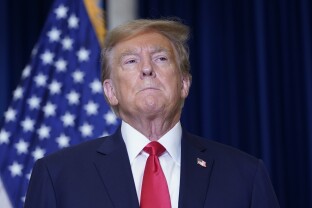For most of the first day of the NATO summit, heads of state avoided commenting on domestic politics in the United States.
But in the final briefing to the press on Wednesday, NATO Secretary General Jens Stoltenberg couldn’t avoid the question any longer: What happens if Donald Trump, who has openly criticized NATO, gets elected?
“I expected the United States to remain a staunch and, of course, important NATO ally,” Stoltenberg told reporters.
The possibility of a Trump presidency loomed large over the summit Wednesday, especially as Democrats publicly grapple with President Joe Biden’s struggling reelection campaign. The anxiety over Biden’s ability to lead the Democratic nomination has brought new stakes to the summit, which is now also a forum for Biden to prove himself on an international stage and at home.
Publicly, international delegates at the summit have kept their thoughts on the political ongoings in the U.S. quiet. But it’s clear that the intrigue of the U.S. election — and Trump’s views on foreign policy — are front and center.
“NATO is the most successful alliance in history because we have been able to stay out of domestic political debates,” Stoltenberg said, but not without making the case for the United States to remain.
“The United States has in NATO something no other major powerhouse has,” he said. “And that is more than 30 friends and allies. Russia doesn’t have that. China doesn’t have that. The United States has that.”
Stoltenberg said he felt NATO has “broad bipartisan support” in Congress from his meetings with both members of the House and Senate.
“I met with Speaker Mike Johnson. I met with both groups of senators this morning from both parties, and they all repeat the same — that NATO is important for the United States,” he said.
Trump’s recent comments on NATO — that he would not defend members of the alliance who do not meet spending targets and his suggestion that Russia could “do whatever the hell they want” to NATO members — rocked the international community.
Johnson, meanwhile, spoke in support of NATO this week but echoed Trump’s concerns about members who are not meeting obligations.
“I mean, if you make a commitment, you’ve got to spend 2% of GDP. You need to do that,” Johnson said at an event at the Hudson Institute on Monday.
Johnson said that while he thinks 2% might not be enough, it’s a starting point for NATO, and wants to support the organization in the future.
“I think it’s a very important thing to maintain. We support it. We celebrate its accomplishments, but there needs to be a renewed sense of commitment,” Johnson said.
Stoltenberg billed these concerns as more manageable.
“The main criticism from former President Trump, but also from other U.S. presidents, has not primarily been against NATO. He has been against NATO allies not investing enough in it,” he said.
But while Trump’s original critique in 2018 was that the United States was “getting ripped off” in supporting NATO, he remains critical of the balance in Ukraine, even as allies have increased their spending.
“I think it’s terrible, is that we’re giving probably, we’re at least a hundred billion dollars more than Europe — meaning Europe as a whole put together,” Trump said last month on the “All In” podcast.
And his positions have had significant sway in the Republican Party. How NATO would handle Trump winning, and Republicans amassing more power in Washington, is a question both domestic and international parties at the summit are eager to hear an answer to.
—
John T. Seward is a NOTUS reporter and an Allbritton Journalism Institute fellow.
Sign in
Log into your free account with your email. Don’t have one?
Check your email for a one-time code.
We sent a 4-digit code to . Enter the pin to confirm your account.
New code will be available in 1:00
Let’s try this again.
We encountered an error with the passcode sent to . Please reenter your email.


